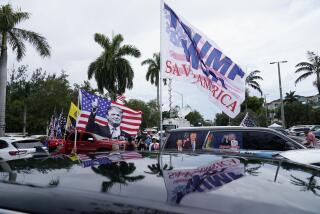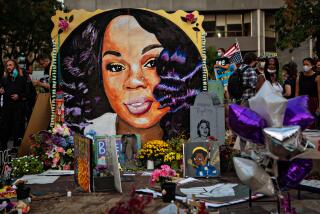AFTER THE RIOTS: THE SEARCH FOR ANSWERS : Citing ‘National Tragedy,’ Judge Moves Officer’s Retrial Again : Courts: Blacks are twice as likely to be in the jury pool in Tallahassee. The police officer is charged with manslaughter in the deaths of two men on a motorcycle.
- Share via
MIAMI — Aftershocks from the Los Angeles riots were felt here Wednesday as the highly charged manslaughter retrial of a Miami police officer was moved again, this time to a city where blacks are twice as likely to be in the jury pool.
Saying he could not ignore “the national tragedy of the urban riots that followed the Rodney King verdict,” Dade County Circuit Judge W. Thomas Spencer ordered the retrial of William Lozano shifted from Orlando to Tallahassee, the state capital.
About 20% of the registered voters in Tallahassee’s Leon County are African-Americans, roughly double the proportion in the Orlando area. Blacks also constitute about 20% of the registered voters in Miami’s Dade County.
Lozano, 32, was convicted in December, 1989, of killing two black men in the Overtown section of Miami when he fired his revolver at an oncoming motorcycle. A bullet struck the driver in the head and killed him instantly, and his passenger was killed in the subsequent crash. The deaths touched off three days of rioting in January, 1989.
Lozano, sentenced to seven years in prison, appealed. He contended that he did not receive a fair trial because the Miami jurors were afraid that acquitting him would lead to further unrest.
Last June, a three-judge appeals court agreed. The judges called Lozano’s trial “fundamentally unfair,” threw out the conviction and ordered a new trial.
After hearings, and over objections of prosecutors and black community leaders, Spencer moved the trial to Orlando last month. He said: “The overwhelming evidence proves that a new jury (in Miami) would have to feel the same impermissible pressures of possible civil disturbances following an acquittal.”
After the King case verdict in Los Angeles and the rioting that followed, Spencer decided that Orlando is too much like Simi Valley. “That so many of our fellow Americans feel shut out from our judicial system demands our attention,” he said Wednesday. “Justice is an elusive quality that demands constant pursuit. Its pursuit in this case demands some changes.”
Black community leaders, who were in the courtroom to hear Spencer’s decision, applauded, but Lozano’s attorney, Roy E. Black, was fuming. “This is an outrageous deprivation of due process of law,” he said.
Lozano was born in Colombia. His lawyer agreed that no other city in Florida resembles Miami in its ethnic makeup--49% Latino, 20% black, 31% whites and others--but he protested that Tallahassee has few Latinos on the voter rolls from which jurors are chosen. “How can he satisfy one ethnic group and totally disenfranchise the defendant’s ethnic group?” Black asked. “Judges are supposed to rule on the evidence, not what’s in the newspaper.”
The shooting and the legal wrangling that continue more than three years later have been a source of friction between Miami blacks and Latinos. Those tensions contributed to Spencer’s opinion that Lozano could not receive a fair trial in Miami.
But changes of venue in trials involving race have also had disastrous results in Florida. The bloodiest riot in Miami history followed a Tampa jury’s acquittal in 1980 of four Dade County police officers charged with the fatal beating of a black motorcyclist. Three days of mayhem followed that verdict, and 18 people were killed.
Lozano’s retrial is scheduled to begin Oct. 6.
More to Read
Sign up for Essential California
The most important California stories and recommendations in your inbox every morning.
You may occasionally receive promotional content from the Los Angeles Times.













